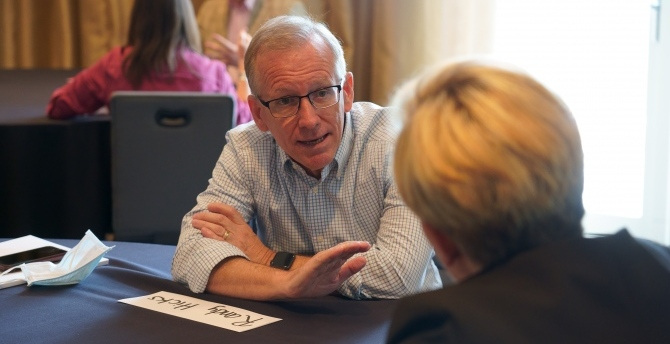
In the last several years, U.S. think tanks have expanded their work to include important liberty topics that are of particular relevance to low-income communities. Are there more frontiers for fighting big government on behalf of the disadvantaged that think tanks could be leading on?
To answer that question 20 think tank leaders and philanthropists convened in Tyson’s Corner, Virginia in August (observing strict social distancing guidelines) to brainstorm and strategize a transformation in free-market advocacy on behalf of low-income communities in the U.S.
In addition to criminal justice and occupational licensing reform, the group developed a host of new ideas for tackling the limitations on property rights that have led to scarce affordable housing. Zoning and development restrictions have severely limited the market’s capacity to meet demand in new and innovative ways. Those advocating for decentralization have the solution and free-market think tanks are uniquely positioned to lead on this issue.
“I see think tanks in the U.S. as an undervalued resource in the U.S. when it comes to tackling poverty,” explained Matt Warner, president of Atlas Network, and the working group’s organizer. “There are major social challenges for which a sharpened and informed set of liberty advocates could come to the rescue.”
Are we up to the challenge?
Daniel Erspamer, CEO of Louisiana-based Pelican Institute thinks so. But it will take leadership. “We know that the best cure for poverty in the long run is more freedom and greater opportunity, yet the near-term solutions have long seemed challenging for freedom-oriented organizations to advance. I'm so grateful to the Atlas Network for hosting this summit in order to share ideas, be inspired, and connect leaders to have maximum impact.”
Free the People’s Terry Kibbe agreed. After the event she concluded, “It was heartening to learn of the efforts on the ground to help reduce poverty. Policy solutions are critical for the long term. But in the short term, we need to be on the ground helping families who have been harmed by poorly thought out government ‘solutions’.”
Kibbe even added, “I don’t think I’ve ever said this before about a conference, but it could have been longer. There’s so much being done in this area now, that I would have loved to hear more!”
Better Cities Project founder, Greg Brooks, has a rich background in city planning and economic development. His organization has released a policy handbook for think tanks, policymakers, and the public to get inspired on practical ways forward.
Amy Cooke, CEO of North Carolina’s John Locke Foundation (JLF), has been leading on public health flexibility in the wake of the pandemic. This was her first Atlas Network event since taking over JLF and she reported, “The Atlas Network is the heartbeat of the international freedom movement. It's only natural that Atlas would be front and center bringing together great minds to discuss how free markets can address poverty and contribute to global human flourishing.”
Cato Institute’s Michael Tanner shared with the group the latest lessons learned leading on reform for low-income communities in California. In his analysis, the study of poverty has tended to lead us down one of two theories. Either people in poor places have made too many bad choices that have limited their economic viability or structural issues and social challenges have prevented prosperity. Tanner suggests there is a third frontier more worthy of our focus—identifying and eliminating bad public policies that limit the freedoms and choices of those in poverty.
Free-market think tanks in the U.S. are uniquely positioned to lead on that third frontier. The group also benefitted from the participation of Stand Together Foundation’s CEO Evan Feinberg who leads investments in social entrepreneurship and direct service organizations tackling poverty across the country. His experiences have shown him that individual initiative is key to eliminating poverty and that a combination of civil society and smarter public policy (expanding choice and flexibility for low-income communities) represent the most promising combination for success.
Atlas Network will be increasing its grantmaking in the U.S. and Canada for projects specifically targeted to support the freedoms of low-income communities as part of our Dignity Unbound work with our new Center for U.S. and Canada. Visit AtlasNetwork.org to learn more.